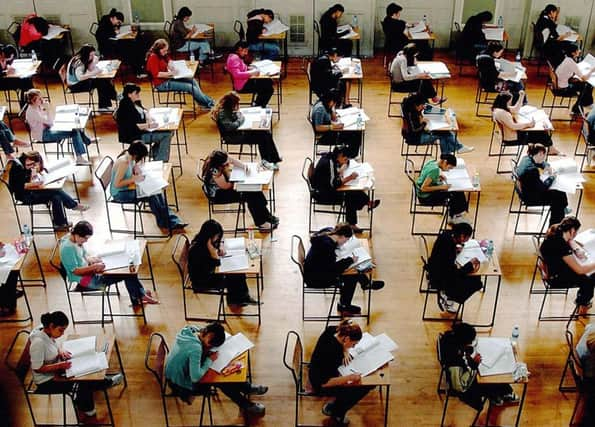Rich are four times more likely to go to university than the poor


A report by the Sutton Trust, an educational charity which seeks to promote social mobility, said Scots from relatively affluent homes are four times more likely to go university than those from more deprived backgrounds – the biggest gap of anywhere in the UK.
The research, which was carried out by academics at Edinburgh University, found there had been no narrowing of the gap between those from working class and middle class homes since 1996.
Advertisement
Hide AdAdvertisement
Hide AdIt said virtually all the growth in higher education places in Scotland over the last decade had been provided by colleges not universities.
It also found large differences in the profile of Scotland’s four “ancient” universities, with Edinburgh and Glasgow taking greater numbers of those from disadvantaged backgrounds than Aberdeen and St Andrews. Umbrella body Universities Scotland said a strict cap on places which allows Scots to receive free tuition had made it harder for those north of the Border to win a place in higher education.
The Sutton Trust study, Access in Scotland, which was led by Professor Sheila Riddell, analysed official data from the Higher Education Statistics Agency.
It found 90 per cent of all growth in those first entering Scottish higher education has been through “sub-degree” courses in colleges.
Advertisement
Hide AdAdvertisement
Hide AdWhile Scots are more likely than their English counterparts to enter some form of higher education, they are less likely to go straight to university, with many “articulating” through college.
In 2013-14, 55 per cent of Scots entered higher education by the age of 30, with 20.9 per cent starting at a further education college and 34.1 per cent going straight to university after school.
In England 46.6 per cent went to university, with just 6 per cent of those moving on from college.
Despite improvements in recent years, those from more affluent backgrounds are four times more likely to go to university than those from more disadvantaged areas, compared to 2.4 times as likely in England and three times in Wales and Northern Ireland.
Advertisement
Hide AdAdvertisement
Hide AdHowever, poorer Scots are more likely to enter leading Russell Group institutions, members of a self-selected association of 24 public research universities, than their English counterparts.
The study said a decision by the Scottish Government to award 720 additional places at ancient universities to the poorest students had been “particularly important”.
Sir Peter Lampl, chairman of the Sutton Trust, said Scotland faced a “shocking access gap”.
He called for an independent commissioner to be appointed to look at the issue, as well as more weight to be given to “contextual admissions”, where an applicant’s background is considered alongside their grades.
Advertisement
Hide AdAdvertisement
Hide AdProfessor Riddell said: “Despite free tuition, the Scottish university sector has much work to do in order to realise the goal of fair access.
“This report sheds new light on the problem, in particular highlighting an over-reliance on the Scottish college sector to increase participation rates overall and, in particular, for students from disadvantaged backgrounds. The report also notes that the supply of university places in Scotland has not kept pace with rising demand, with detrimental consequences for less advantaged students.”
First Minister Nicola Sturgeon has made education and reducing the so-called “attainment gap” between middle and working class homes a key priority of her government, appointing her deputy John Swinney as education secretary.
But Scottish Labour’s education spokesman, Iain Gray, said it was the SNP’s record in government that was letting down poorer students.
Advertisement
Hide AdAdvertisement
Hide AdHe said: “This report shows that the SNP record on colleges – 152,000 fewer college students, poor student support and botched mergers which staff say has done nothing to improve teaching – is letting down many of the poorest students who can get into higher education.
“Nicola Sturgeon says that education is her top priority, she has put her best minister in charge and devoted plenty of warm words to it. The question now is whether there is any substance behind this or if it is all just spin. Any government that is serious about education would protect education spending.”
Tory education spokeswoman Liz Smith added: “This report lays bare two key points. Firstly, the Scottish Government’s policy of capped places has made it more difficult for domiciled Scots to get into university.
“Secondly, while there is some limited progress in Scotland, it is not as good as in other parts of the UK, and that partly reflects the fact there is a much lower base of bursary support than in the rest of the UK.”
Advertisement
Hide AdAdvertisement
Hide AdThe National Union of Students said the Sutton Trust report highlighted the need for “radical” reform, with a need for more financial support to be put in place to support students to stay in higher education.”